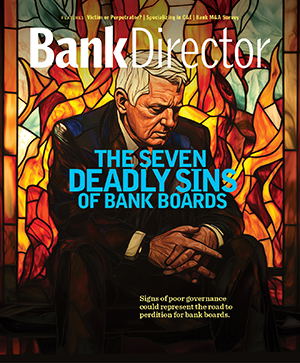
Inside Ownership: Which Banks Like “Home Cooking”?
 One of the basic rules that always seems to resonate with investors is knowing which bank executives and directors like to “eat their own cooking.” Long before Warren Buffett starting preaching about it in his annual shareholder letters (https://www.berkshirehathaway.com), inside ownership by senior management and directors has been a standard that is very characteristic of high performing banking organizations. Based on my 20 years’ experience as an equities analyst, those companies that post better intermediate- and long-term earnings performance (and also seem to be must faster to adapt to changes in the industry) are those where the CEO and directors are large direct shareholders.
One of the basic rules that always seems to resonate with investors is knowing which bank executives and directors like to “eat their own cooking.” Long before Warren Buffett starting preaching about it in his annual shareholder letters (https://www.berkshirehathaway.com), inside ownership by senior management and directors has been a standard that is very characteristic of high performing banking organizations. Based on my 20 years’ experience as an equities analyst, those companies that post better intermediate- and long-term earnings performance (and also seem to be must faster to adapt to changes in the industry) are those where the CEO and directors are large direct shareholders.
After the 2008 financial crisis and Great Recession diminished many banks’ stock values, how much “skin-in-the-game” do public community banks still maintain? Along with one of my FIG Partners research colleagues, I reviewed the proxy filings for 35 community bank stocks to test my theory that actual dollars of ownership vary widely among public financial institutions. Only four banks in our sample size exceeded $10 billion in total assets; the remainder range in size from $9.9 billion to just over $400 million. The majority of the work was done by hand as I read individual proxies filed in Spring 2011, and I made a real effort to read all of the footnotes to ensure actual shares owned were separated from options that had been granted but not yet exercised. I have no philosophical issue against options, but when keeping score on “home cooking” only the shares that are actually held should matter.
Using today’s share prices, my calculations shows how much stock CEOs, CFOs and board members own in dollar terms. I sorted the proxies into banks in asset size buckets of below $1 billion, $1-$3 billion, $3-$6 billion, $6-$10 billion and a few larger banks with more than $10 billion in assets. The results are widely dispersed. Three banks with less than $1 billion in assets had over 20 percent of their current market capitalization held by insiders (with a minimum of $6.5 million owned at one $500 million bank) and then we found another six banks between $1-$3 billion who had at least 15 percent of their total enterprise value held around the board table. These stakes were worth at least $8 million, but one bank had a $50 million stake held by the CEO and a handful of directors.
When we examined larger banks close to $5 billion and just below $10 billion in assets, it was not unusual to see companies with only 3 percent to 4percent of their market cap held by insiders. But this is misleading and explains why I prefer to look at real dollars instead of the percentage of ownership. A large bank with just 3 percent insider ownership by the CEO and board chair might not sound very impressive until you realize their actual dollar holdings total $23 million.
For some specific examples, IBERIABANK (IBKC-NASDAQ) has $48 million of insider ownership among 20 ladies and gentlemen. For the investors who complain that IBERIA has issued too many shares and grown too fast in recent years, just remember that $2.2 million in hard cash is at stake for each director every day the banks opens its doors. The same can be said of First Bancorp (FBNC-NASDAQ) which has almost $18 million or close to $1 million per insider.
We remain strong advocates of bank executives and directors maintaining significant ownership stakes in their institutions. For many banks stocks still selling at a discount to their tangible book, this is a tremendous opportunity to create a nest of golden eggs for the years ahead, while also signaling investors that these insiders are confident in the future of their institutions. For more background, please see our data and analysis on insider ownership.


